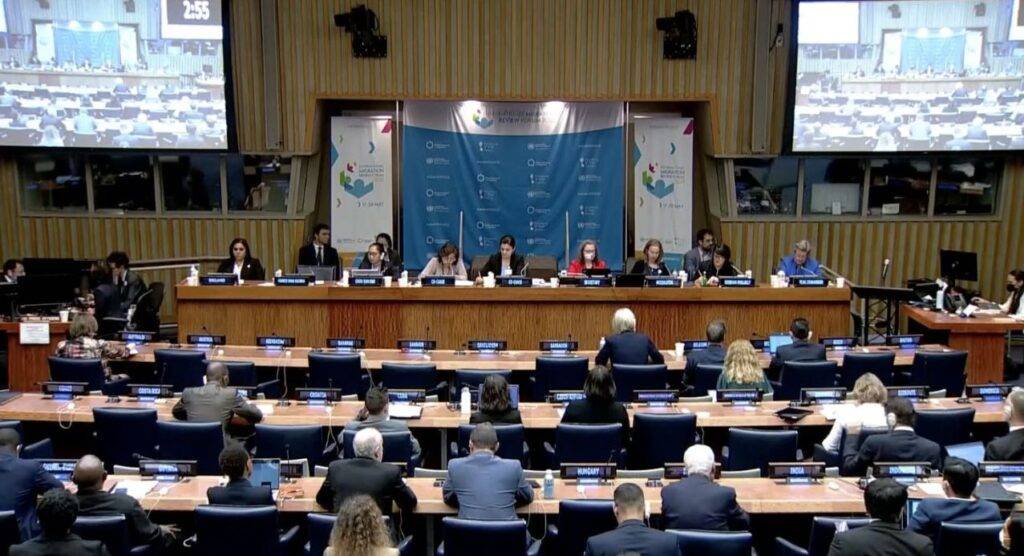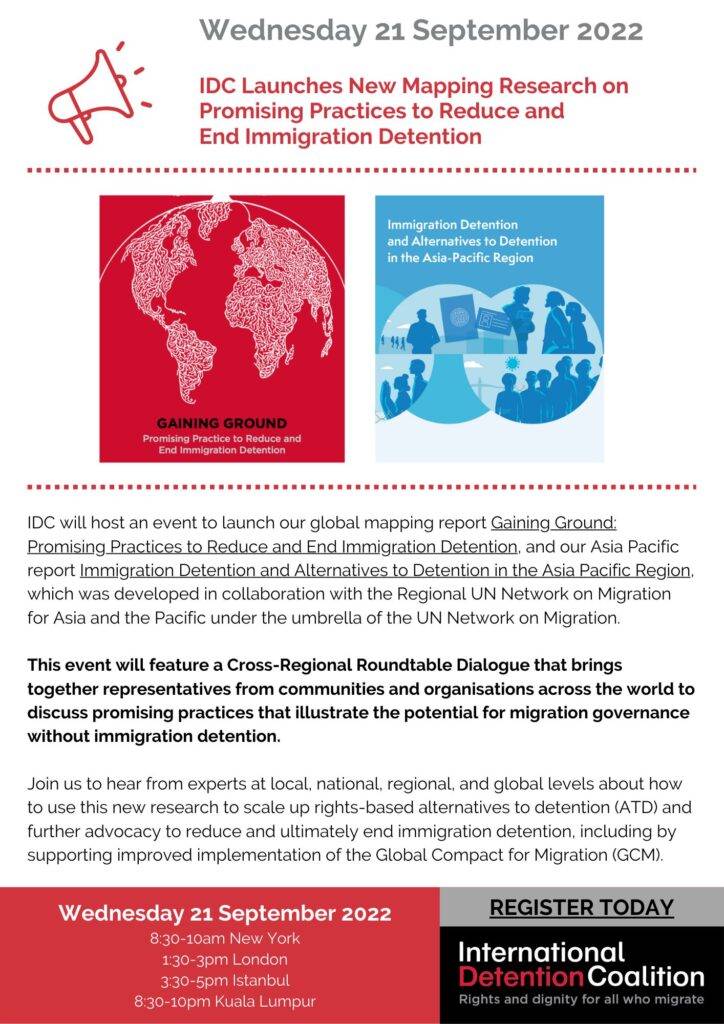The May 2022 International Migration Review Forum (IMRF) was a critical moment to connect local, national, regional and global advocacy efforts, and represented a key milestone towards building momentum on ending child immigration detention and prioritising alternatives to immigration detention (ATD). It also presented an opportunity for the migration sector to shape the global narrative of civil society advocacy, and to set a foundation to focus on the rights of migrants and national level change for the next four year cycle ahead of the next IMRF in 2026, as discussed in IDC’s Approach During the IMRF and Beyond.

Since the adoption of the Global Compact for Safe, Orderly and Regular Migration (GCM) in December 2018, there has been an incredible amount of work accomplished to build on the adoption of the GCM under a whole-of-society approach, including by civil society groups and organisations, governments, local authorities, UN agencies and other stakeholders. For example, the UN Network on Migration was established in 2018 “to ensure effective, timely and coordinated system-wide support to Member States” in their efforts to implement the GCM. Building a functioning system of support at national, regional and global levels has been a key priority for the UN Network on Migration over the past four years.
Within the UN Network on Migration, IDC is proud to co-lead, with UNHCR and UNICEF, the Working Group on ATD which is tasked with promoting the development and implementation of non-custodial, human rights-based ATD in the migration context, in line with Objective 13 of the GCM. Working Group members include representatives of civil society organisations, migrant communities, young people, local governments, and UN agencies working on immigration detention issues and ATD across the world. The Working Group has developed a set of technical guidance and snapshots on ATD, and has steered, in collaboration with the governments of Thailand, Portugal, Colombia, and Nigeria, three global peer learning exchanges on ATD in recent years. IDC also co-leads the UN Migration Network Group working group on ATD in the Asia Pacific, as well as co-leads working groups at the national level to implement Objective 13 of the GCM. These efforts, such as linking national, regional and global initiatives, are part of a long-term movement to reduce and ultimately end immigration detention, and resulted in detention and ATD being key priorities for States to address during the IMRF (also view the IMRF press conference by the President of the General Assembly to hear more about the priorities, including ATD).
What actually happened at the IMRF?
During the IMRF, some States, including Colombia, Mexico, Germany, Thailand, among others, made pledges regarding ending child immigration detention and promoting best practice on this matter. IDC supported in drafting some of these global pledges, which was a process that exemplified the importance of sustained advocacy, collaboration and strategic government engagement at global, national and local levels, as well as the GCM principles of whole-of-government and whole-of-society approaches. The UN Network on Migration has launched The Pledging Dashboard to collate State commitments in the implementation of the GCM. Please review and see if your government has made a pledge!
With regards to immigration detention and ATD, both issues were featured quite extensively in State and multi-stakeholder discussions throughout the IMRF. This included commentary on concerns about the increasing and aggressive use of immigration detention in many regions of the world, as well as analysis of progress being made to promote ATD more widely and to work to end child immigration detention. In particular, child immigration detention was a centrepiece of detention-related discussion, and proved to be quite contested in the negotiations and eventual adoption of the 2022 IMRF Progress Declaration. While the GCM itself includes actionable commitments to work to end child immigration detention, some States attempted to now soften this commitment through the negotiations of the Progress Declaration. However, through the multi-level, multi-stakeholder advocacy of IDC and its partners at the IMRF, and the effort of some champion countries, the issue was indeed advanced in the Progress Declaration and included States determination to “consider, through appropriate mechanisms, progress and challenges in working to end the practice of child detention in the context of international migration.”
Key IMRF Takeaways
For IDC, the framework for moving forward beyond the 2022 IMRF will involve coordinating a multi-level agenda that uses national, regional and global momentum to make change on the ground and that centres the rights of migrants in all GCM implementation efforts. Particularly key for IDC in the next period, in our role as a convener of multi-level peer learning, is ensuring connection, coherence and coordination between national, regional and global efforts, which will allow us to enhance whole-of-government and whole-of-society approaches in the interest of change. The key takeaways from the 2022 IMRF that will support and guide our work across all levels include:
1. Global Visibility of Immigration Detention & ATD
Following much political turmoil in various global and regional processes over the years – addressing the use of immigration detention, working to end child immigration detention and the promotion of ATD are now solid components of the global migration agenda through the GCM. This is an important win, and resulted from the sustained strategic engagement and narrative shifting performed by many actors across various spaces. The next step is to use this global affirmation to enhance and leverage national action and change that results in tangible protection of migrant rights towards a world without immigration detention.
2. Multi-Level Peer Learning as a Key Approach
Through the UN Network on Migration Working Group on ATD and regional Platforms such as a the Regional State Platform in the Asia Pacific , IDC and its partners have coordinated and led peer learning processes for government actors over many years. IDC advanced this particular methodology across local, national, regional, and global levels through the development of communities of practice. This method has now been integrated into the Progress Declaration and officially recognised as a mechanism for analysing progress, “…calls on the Network to cooperate with Member States and relevant stakeholders to strengthen collaboration, peer-learning, engagement and linkages at global, regional, national and local levels.”
3. Centering Grassroots & Lived Experience Leadership
While purposeful efforts have been made to address the limited adequate mechanisms for engaging civil society in UN and global processes, particularly directly impacted people and communities – this is a systemic issue that requires a systemic solution. An entire mindset shift regarding leadership, equity, and accountability is needed to transform these systems and ensure meaningful participation and representation moving forward. As discussed in IDC’s article in the Spotlight Report on Global Migration, “Migrants give life to these issues, and are key to making this necessary transformation in collaboration with different stakeholders, including government allies. To end immigration detention we will need the same perseverance and determination as those who have survived detention. And if we work together with solidarity, understanding, and with a genuine desire to make a change, we can achieve it (page 19).”
Moving Forward
IDC alongside our members and partners in the coming period, will focus on ensuring implementation of the pledges made at the IMRF, expanding advocacy on ending immigration detention beyond ending the detention of children, continuing to connect local, national, regional and global agendas, facilitating and coordinating strategic peer learning spaces, and centering the leadership of people with lived experience of detention in all of our efforts.
The focus of the UN Network on Migration moving forward will be national implementation, including the development of national action plans by governments. As such, all of our roles in actualising the GCM are most important now that we are beyond the 2022 IMRF. As civil society, we must be ready to organise, engage, and advocate to ensure governments are living up to their GCM commitments on the ground. There will be an Annual Meeting of the UN Network on Migration in October 2022, where these priorities will be discussed and a new work plan for the Network will be developed with the input of civil society and other actors. Additionally, IDC aims to enhance the Working Group on ATD exchange space by redesigning it to more effectively connect national, regional and global levels in order to increase our collective ability to give life to the GCM. This will involve creating a more diverse and dynamic membership for the Working Group in the upcoming period. Additionally, we will continue with our work as co-leads of the ATD Working Group in the Asia Pacific and with the Regional Networks in other regions; and also continue co-leading relevant working groups and participating in UN Migration Network national efforts in selected GCM champion countries. Key to this agenda will be the effective coordination and connection between national, regional and global initiatives aiming to implement Objective 13 and promote ATD to ultimately end immigration detention. Please contact IDC Global Advocacy Coordinator Silvia Gómez [email protected] for more information and to explore possibilities for engagement.
Lastly, four months after the IMRF, IDC will host an event on 21st September 2022, to launch our global mapping report Gaining Ground: Promising Practices to Reduce and End Immigration Detention and our Asia Pacific report Immigration Detention and Alternatives to Detention in the Asia Pacific Region, which was developed in collaboration with the Regional UN Network on Migration for Asia and the Pacific under the umbrella of the UN Network on Migration.
REGISTER and join us to hear from experts at local, national, regional, and global levels about how to use this new research to scale up rights-based ATD and further advocacy to reduce and ultimately end immigration detention, including by supporting improved implementation of the Global Compact for Migration (GCM).

Written by Carolina Gottardo Executive Director, Silvia Gómez Global Advocacy Coordinator & Mia-lia Boua Kiernan Communications & Engagement Coordinator